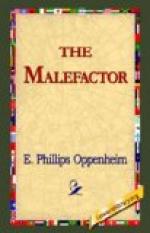“Perfectly, your ladyship.”
The Marchioness rested, but she did not sleep. She was thinking of Wingrave!
It was not Lady Ruth, but her husband, who was waiting to see Wingrave on his return. Aynesworth was talking to him, but at once withdrew. Wingrave nodded with slightly upraised eyebrows. He never shook hands with Barrington.
“You wanted to see me?” he inquired, carelessly turning over a little pile of letters.
Barrington was ill at ease. He hated himself and he hated his errand.
“Yes, for a moment or two—if you’re not busy,” he said. “May I smoke? I’m nervous this morning.”
“Help yourself,” Wingrave said shortly. “Cigarettes and cigars on the sideboard. Touch the bell if you’ll take anything to drink.”
“Thanks—Aynesworth gave me a brandy and soda. Capital fellow, Aynesworth!”
“Have another,” Wingrave said shortly.
He crossed the room to the sideboard. Wingrave glanced up from his letters, and smiled coldly as he saw the shaking fingers.
“I don’t often indulge like this,” Barrington said, turning away from the sideboard with a tumbler already empty in his hands. “The fact is, I’ve had rather a rude knock, and Ruth thought I’d better come and see you.”
Wingrave remained a study of impassivity. His guest’s whole demeanor, his uneasy words and nervous glances were an unspoken appeal to be helped out in what he had come to say. And Wingrave knew very well what it was. Nevertheless, he remained silent—politely questioning. Barrington sat down a little heavily. He was not so carefully dressed as usual; he looked older, his appearance lacked altogether that air of buoyant prosperity which was wont to inspire his friends and creditors with confidence.
“I’ve been a fool, Wingrave,” he said. “You showed me how to make a little money a few weeks ago, and it seemed so easy that I couldn’t resist having a try by myself, only on rather a larger scale. I lost! Then I went in again to pull myself round, and I lost again. I lost—more than I can easily raise before settlement.”
“I am sorry,” Wingrave said politely. “It is very unwise to meddle in things you know so little about.”
For a moment the worm turned. Barrington rose to his feet, and with a deep flush upon his cheeks moved towards the door. But his spark of genuine feeling died out almost as soon as it had been kindled. Outside that door was ruin; within, as he very well knew, lay his only chance of salvation. He set down his hat, and turned round.
“Wingrave,” he said, “will you lend me some money?”
Wingrave looked at him with upraised eyebrows.
“I,” he remarked, “lend you money? Why should I?”




